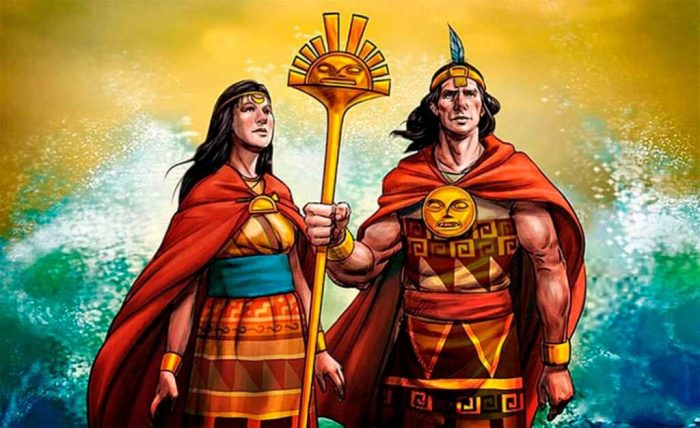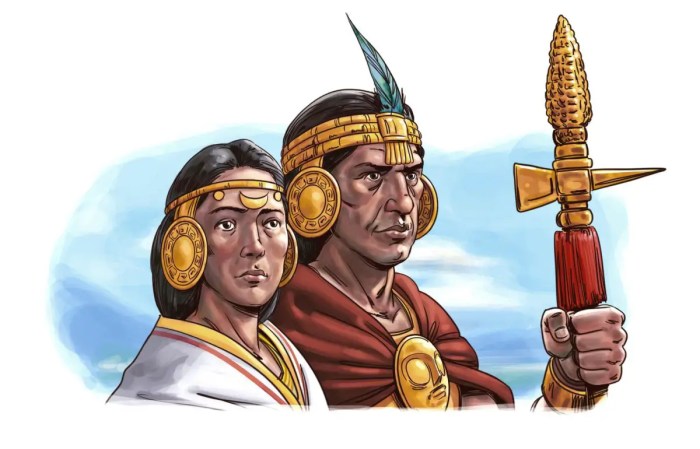Immerse yourself in the captivating tale of Manco Capac and Mama Ocllo, the legendary founders of the Inca Empire. Their divine origins and pivotal roles in establishing Cusco and shaping Inca society make their story an enduring legacy in the annals of history.
From their divine origins to their leadership and cultural influence, this narrative delves into the fascinating world of Manco Capac and Mama Ocllo, offering a glimpse into the very foundation of one of the greatest civilizations of the Americas.
Manco Capac and Mama Ocllo: Origins and Mythology

In Inca mythology, Manco Capac and Mama Ocllo are revered as the founders of the Inca Empire. Their origins are shrouded in the realm of myth and legend, interwoven with tales of divine creation and ancestral lineage.
Creation Myth
According to Inca mythology, Manco Capac and Mama Ocllo emerged from the depths of Lake Titicaca, sent forth by the sun god Inti to bring civilization to the people of the Andes. They carried with them a golden staff called the “tapac yauri,” which was believed to possess the power to transform barren land into fertile fields.
Guided by the staff, Manco Capac and Mama Ocllo traveled northward, searching for the ideal location to establish their kingdom. Along their journey, they encountered various tribes and peoples, sharing knowledge and teaching them the arts of agriculture, weaving, and pottery.
Divine Origins
Manco Capac and Mama Ocllo were believed to be the children of Inti, the sun god, and Mama Quilla, the moon goddess. As divine beings, they possessed supernatural powers and were considered intermediaries between the gods and the people.
Manco Capac was often depicted as a wise and benevolent ruler, responsible for establishing laws, social order, and religious practices. Mama Ocllo, on the other hand, was revered as the mother of the Inca people and the patroness of weaving and fertility.
The Founding of Cusco
Manco Capac and Mama Ocllo played pivotal roles in the establishment of Cusco, the capital of the Inca Empire. According to legend, they emerged from the waters of Lake Titicaca and embarked on a journey to find a suitable site for their city.
Choosing the Site
As they traveled, Manco Capac carried a golden staff, which he used to probe the ground. When the staff sank effortlessly into the earth at the present-day site of Cusco, it was taken as a sign that this was the chosen location.
Establishing the City
Manco Capac and Mama Ocllo founded Cusco as a small village, but it quickly grew into a thriving metropolis. They divided the city into two halves, Hanan Cusco (Upper Cusco) and Hurin Cusco (Lower Cusco), each with its own set of temples, palaces, and residences.
Sacred Importance
Cusco was not only the political center of the Inca Empire but also held deep religious significance. It was believed to be the birthplace of the Inca gods and the center of the Inca world. The city was adorned with numerous temples and shrines, and its layout was designed to reflect the Inca’s cosmological beliefs.
The Inca Empire

The Inca Empire, known for its advanced civilization and vast territory in ancient South America, was founded by Manco Capac and Mama Ocllo. Their leadership played a crucial role in establishing and governing the empire.
Leadership Roles of Manco Capac and Mama Ocllo
Manco Capac, considered the first Inca emperor, was responsible for establishing the Inca Empire and its capital city, Cusco. He is often depicted as a divine figure, descended from the sun god Inti. His primary role was to lead the Inca people in their conquest and expansion, as well as to establish laws and customs that would govern the empire.
Mama Ocllo, the wife and sister of Manco Capac, was an equally important figure. She played a significant role in establishing Inca society and its cultural practices. Mama Ocllo taught the Inca women how to weave, cook, and care for their families.
She is also credited with introducing the Inca to agriculture, specifically the cultivation of potatoes, maize, and quinoa.
Together, Manco Capac and Mama Ocllo laid the foundation for the Inca Empire, establishing its political, social, and economic structures. Their leadership shaped the empire’s identity and paved the way for its future prosperity.
Manco Capac and Mama Ocllo are the legendary founders of the Inca civilization. They are said to have emerged from Lake Titicaca and brought civilization to the Andean people. If you’re interested in learning more about the Incas, there’s a free Amap training program in NYC that can teach you about their culture and history.
The program is open to all ages and skill levels, so it’s a great way to learn more about this fascinating civilization.
Social and Cultural Impact

Manco Capac and Mama Ocllo played a pivotal role in shaping Inca society, deeply influencing their beliefs, customs, and traditions.
Influence on Inca Beliefs
The Incas revered Manco Capac and Mama Ocllo as divine beings, the founders of their civilization and the children of the sun god Inti. Their story became a foundational myth, providing a sacred narrative for the Inca’s origin and legitimacy.
Influence on Inca Customs, Manco capac and mama ocllo
The Inca adopted many customs and traditions attributed to Manco Capac and Mama Ocllo. These included:
- Marriage customs:Marriages were arranged by the Inca rulers, with women often marrying their brothers to preserve the royal lineage.
- Agricultural practices:The Incas believed that Mama Ocllo taught them how to cultivate crops, especially maize and potatoes.
- Textile arts:Mama Ocllo was credited with introducing weaving and textile production to the Inca, skills that became highly valued in Inca society.
Symbolism and Legacy

Manco Capac and Mama Ocllo hold profound symbolic significance in Inca history and culture. As the legendary founders of the Inca Empire, they embody the divine origins and cultural values of the Inca people.
Symbolic Meanings
- Golden Staff:Manco Capac’s golden staff, the “Tupaq Yauri,” represented the Inca’s divine mandate to rule. It was said to have sprouted from the earth, symbolizing the Inca’s connection to the land and their legitimacy as rulers.
- Virginity:Mama Ocllo’s virginity symbolized purity, fertility, and the divine nature of the Inca Empire. Her chastity was believed to ensure the well-being and prosperity of the Inca people.
- Brother-Sister Marriage:The incestuous marriage between Manco Capac and Mama Ocllo represented the unity and harmony of the Inca Empire. It symbolized the merging of different lineages and the importance of family ties.
Enduring Legacy
The legacy of Manco Capac and Mama Ocllo extends far beyond their legendary roles as founders. They continue to be revered as symbols of Inca culture and history:
- Inca Mythology:Their story remains an integral part of Inca mythology, passed down through generations in oral traditions and artistic representations.
- Cultural Symbolism:Images of Manco Capac and Mama Ocllo are commonly found in Inca art, textiles, and architecture, serving as reminders of their divine origins and cultural significance.
- National Identity:In modern Peru, Manco Capac and Mama Ocllo are celebrated as symbols of national pride and cultural heritage, connecting the present with the ancient past.
FAQ Explained: Manco Capac And Mama Ocllo
Who were Manco Capac and Mama Ocllo?
Manco Capac and Mama Ocllo were legendary figures believed to be the founders of the Inca Empire and the first rulers of Cusco.
What is the significance of Manco Capac and Mama Ocllo in Inca mythology?
In Inca mythology, Manco Capac and Mama Ocllo were revered as divine beings sent by the sun god Inti to establish civilization on Earth.
How did Manco Capac and Mama Ocllo establish the Inca Empire?
According to legend, Manco Capac and Mama Ocllo emerged from Lake Titicaca and journeyed northward, founding Cusco and establishing the Inca Empire.

